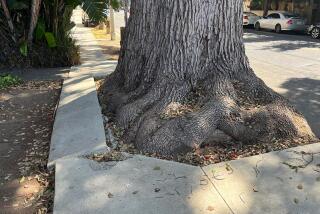Oxnard Approves $4.5-Million Plan for La Colonia Area Improvements
- Share via
The Oxnard City Council approved a plan this week to spend $4.5 million for street repairs, park improvements, low-interest loans and graffiti removal in the La Colonia neighborhood, the city’s barrio.
The plan, which culminates three months of meetings between city officials and La Colonia residents, also calls for increasing code enforcement, street sweeping and police activities in the blighted neighborhood. The area of about one square mile has an estimated 20,000 residents, most of them Latino.
“We’ve been sitting around for a long time doing nothing,” Councilwoman Dorothy S. Maron said at Tuesday’s council meeting. “This could make all the difference of cleaning up and fixing up a neighborhood that really needs help.”
Bridge Gap
Councilman Manuel Lopez said he hoped that the plan could bridge the gap between the “new Oxnard and an older part of the city” that, he said, has escaped the some of the benefits of recent development.
Residents of the neighborhood, which also includes the Rose Park tract, reacted enthusiastically to the council’s plan.
“In the 23 years I’ve been living in the Colonia, I haven’t seen this level of interest,” Jose B. Gonzalez, a 44-year-old mechanic, told the council.
The long-awaited plan comes nearly six months after residents complained in a sharply worded letter submitted to the council about conditions in the neighborhood, where many of the houses show visible signs of decay. It also follows several meetings between city officials and neighborhood leaders, and a meeting last month attended by about 100 Colonia residents.
Resident Complaints
In the letter, residents complained about the neighborhood’s heavily rutted streets, abundant and rowdy bars, and numerous city code violations, which include raising barnyard animals within city limits, abandoning cars on city streets and dumping trash on the many vacant lots in older sections.
In meetings with city officials since then, neighborhood leaders have complained that the city’s Housing Rehabilitation Loan Program, which provides low-interest loans to low-income renters and homeowners, is still out of the reach of most of Colonia residents. The 1980 census found the average family income to be half that of the city as a whole.
While residents have expressed general satisfaction with the Oxnard Police Department in the neighborhood where the crime rate has dropped in recent years, they complained at the May 17 community meeting about a lack of Spanish-speaking police dispatchers.
City officials, who acknowledge that some calls from Spanish-speakers are routed to a translation service in Hayward, said they plan to employ more Spanish-speaking dispatchers.
Improve Properties
In an effort to spur homeowners to improve their properties, the Housing Authority will lower eligibility requirements for its 6% loan program and match loans up to $12,500 with grants at a cost of about $80,000 in the first year.
Improvements to the neighborhood’s streets account for the bulk of improvements at a cost of $3.2 million over four years. Many have not been resurfaced since La Colonia was established about 40 years ago as home to farm workers. Nearly half of the money will be used to widen 3rd Street on the eastern border of the neighborhood, which extends from Rice Avenue to Oxnard Boulevard.
Another large expense comes in the form of matching funds for a public gymnasium, for which the city has already received $450,000 in state funding. The city will spend an additional $650,000 to build the 8,800-square-foot facility. The city will also spend nearly $80,000 to improve lighting in Del Sol Park, the expansive park that lies between the Colonia and Rose Park tracts.
Little Cost
Many of the steps outlined in the plan, however, will cost the city little if anything. They include stepping up notification of street-sweeping days so that residents can move their cars and enforcing visible violations of city codes instead of waiting for them to be reported.
City officials also plan to launch new efforts to start a Neighborhood Watch. They said such measures in the past have been met with a mixture of apathy and suspicion by the residents, some of whom fear authorities because they are in this country illegally.
Changes in the city’s zoning laws would phase out many businesses selling liquor when they change hands.
City officials also expressed the hope that the recent hiring of a former division manager with the United Farm Workers union as the city’s senior community relations specialist will encourage participation of Colonia residents in the face lift.
“You can appropriate all the money you want,” said Karl Lawson, the newly hired specialist. “But we really need citizen involvement.”
More to Read
Sign up for Essential California
The most important California stories and recommendations in your inbox every morning.
You may occasionally receive promotional content from the Los Angeles Times.













